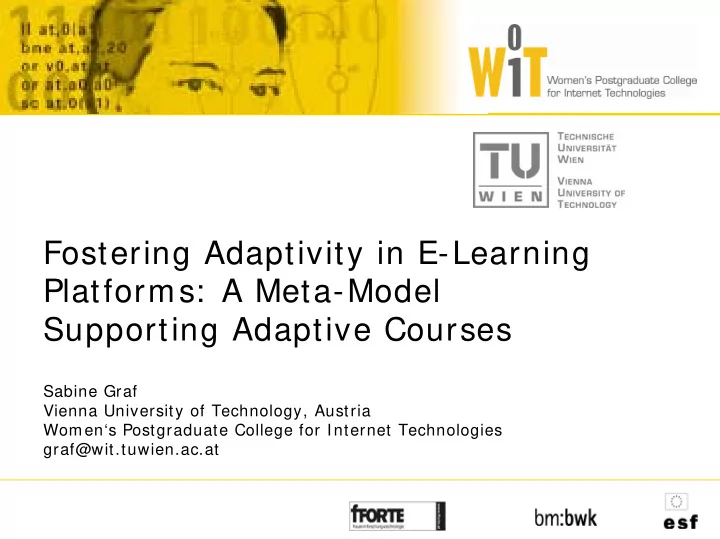

Fostering Adaptivity in E-Learning Platforms: A Meta-Model Supporting Adaptive Courses Sabine Graf Vienna University of Technology, Austria Women‘s Postgraduate College for Internet Technologies graf@wit.tuwien.ac.at
Motivation and Aims � E-learning platforms are often used in e-education but they provide the same course for all learners � Learners have different needs � Adaptivity increase the learning progress How to bring more adaptivity in e-learning platforms focusing on learning styles? Basic concept: � Author creates individual learning objects � System composes the learning objects to different courses � Description saying how courses need to be designed to provide adaptivity (= meta-model) Easy applicable for all platforms • Platforms should not lose their simplicity • 2
Felder-Silverman Learning Style Model Richard M. Felder and Linda K. Silverman, 1988 � Each learner has a preference on each of the four dimensions � Dimensions: � � Active – Reflective learning by doing – learning by thinking things through group work – work alone � Sensing – Intuitive concrete material – abstract material more practical – more innovative patient / not patient with details � Visual – Verbal learning from pictures – learning from words � Sequential – Global learn in linear steps – learn in large leaps good in using partial knowledge – need „big picture“ Strong preference but no support � problems � 3
Supporting Learning Styles in E-Learning Platforms Learning Style E-Learning Theory Platforms • Which kinds of learning objects/activities can be used to adapt to the learning style? • Which kinds of learning objects/activities are commonly used? 4
Meta-Model Course active - reflective 1..* 1..* sensing – intuitive Chapter visual - verbal 1..* sequential - global 1..* LearningUnit 1..* 1..* Learning Object 0..* Collection Chat Forum 0..* 0..* 0..* 0..* 0..* 0..* Multimedia Content Link Object 0..* 0..* includes includes 0..* 0..* describes Test Exercise Example Content 0..* 1..* 0..* 0..* 0..* 0..* is about 0..* 1..* Question 5
A course for a global learner Links Additional Section 6
A course for a sequential learner Links Exercises & Tests 7
Conclusion & Future Work � Meta-model for supporting adaptive courses � Describes how courses should be designed to provide adaptivity � Easy to integrate in e-learning platforms without losing their simplicity � generate different course instances out of one course � generate a suitable course for each learner � We have implemented the meta-model in Moodle � Future Work: � Implementing a tool that generates different course instances � Implementing a tool that identifies the learning style of a learner � Extending the meta-model by including also not commonly used features 8
Recommend
More recommend